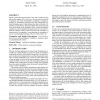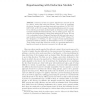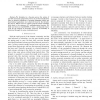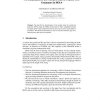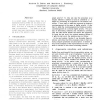136
click to vote
ISSTA
2012
ACM
13 years 4 months ago
2012
ACM
Recent research has suggested that a large class of software bugs fall into the category of inconsistencies, or cases where two pieces of program code make incompatible assumption...
223
click to vote
CADE
2011
Springer
14 years 2 months ago
2011
Springer
Deduction modulo is a generic framework to describe proofs in a theory better than using raw axioms. This is done by presenting the theory through rules rewriting terms and proposi...
111
click to vote
ARESEC
2011
14 years 2 months ago
2011
—We formalise in a theorem prover the notion of provable anonymity proposed by Garcia et al. Our formalization relies on inductive definitions of message distinguish ability and...
125
click to vote
PODC
2011
ACM
14 years 4 months ago
2011
ACM
We present a cryptographic framework to achieve access control, privacy of social relations, secrecy of resources, and anonymity of users in social networks. The main idea is to u...
152
click to vote
PLDI
2011
ACM
14 years 4 months ago
2011
ACM
Program analysis and verification tools crucially depend on the ability to symbolically describe and reason about sets of program behaviors. Separation logic provides a promising...
134
click to vote
ENTCS
2006
15 years 2 months ago
2006
To broaden the scope of decision procedures for linear arithmetic, they have to be integrated into theorem provers. Successful approaches e.g. in NQTHM or ACL2 suggest a close int...
105
click to vote
CSL
2010
Springer
15 years 3 months ago
2010
Springer
We describe the formalisation of the normal forms of context-free grammars (CFGs) using the HOL4 theorem prover. These straightforward pen and paper proofs easily understood from t...
133
click to vote
IJCAI
1989
15 years 3 months ago
1989
In a recent paper, Ginsberg shows how a backward-chaining ATMS can be used to construct a theorem prover for circumscription. Here, this work is extended to handle prioritized cir...
133
click to vote
IJCAI
2003
15 years 3 months ago
2003
Query answering over commonsense knowledge bases typically employs a first-order logic theorem prover. While first-order inference is intractable in general, provers can often b...
140
click to vote
FMCAD
2008
Springer
15 years 3 months ago
2008
Springer
We present a method for verifying information flow properties of software programs using inductive assertions and theorem proving. Given a program annotated with information flow a...
